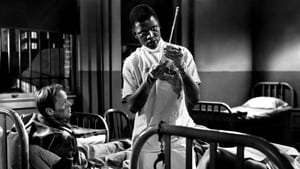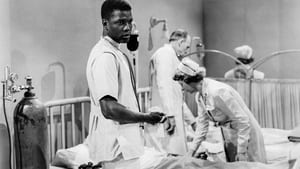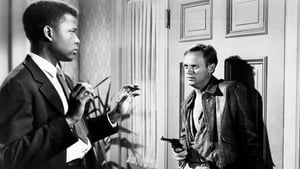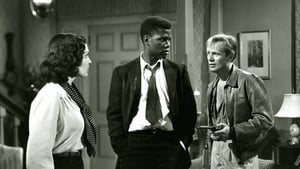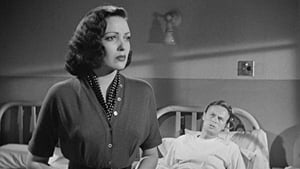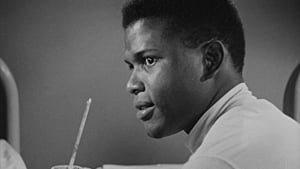Contact: [email protected]
Video Sources 0 Views
- Watch trailer
- No Way Out

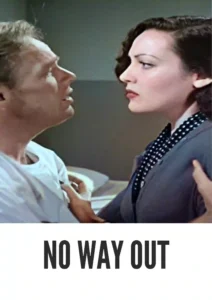
Synopsis
Table of Contents
ToggleReview: No Way Out (1950) – A Gripping Exploration of Race and Justice

Introduction
No Way Out, released in 1950, stands as a powerful and groundbreaking film that delves into the complexities of race, prejudice, and justice in post-World War II America. Directed by Joseph L. Mankiewicz, this gripping drama confronts viewers with uncomfortable truths about systemic racism and the struggle for equality. In this review, we will explore the impact and significance of No Way Out in the realm of cinematic art.
Check The Full Colorized Movies List
Check Our Colorized Movies Trailer Channel
Understanding No Way Out (1950): Director, Cast, and Genre
Directed by Joseph L. Mankiewicz, No Way Out features a talented ensemble cast including Richard Widmark as Ray Biddle, Sidney Poitier as Dr. Luther Brooks, and Linda Darnell as Edie Johnson. The film falls within the genre of social drama, characterized by its exploration of topical issues and social injustice.
Exploring the World of No Way Out (1950): Plot and Characters
Set in a racially divided city, No Way Out follows the story of Dr. Luther Brooks, a young African American doctor who becomes embroiled in a deadly conflict with a racist patient, Ray Biddle. As tensions escalate, Dr. Brooks must navigate a hostile environment while confronting his own biases and the systemic injustices that threaten to tear apart the community. Through its gripping storyline and compelling characters, the film offers a searing indictment of racism and prejudice in America.
The Art of Film Colorization
While No Way Out was originally filmed in black and white, its early colorized version adds a new layer of visual richness and depth to its powerful narrative. The colorization process enhances the film’s evocative cinematography and captures the intensity of its emotional moments with stunning clarity.
Early Colored Films: A Brief History
The history of early colored films is marked by innovation and experimentation as filmmakers sought to enhance the visual appeal of their movies. From hand-tinted frames to pioneering technicolor processes, the evolution of colorization techniques transformed the cinematic landscape, offering audiences a new way to experience classic stories and social dramas.
No Way Out (1950) and Its Early Colored Version
The decision to release No Way Out in a colorized format was made with the intention of immersing audiences in the emotional intensity of its narrative and enhancing the film’s visual impact. While some purists may prefer the original black and white version, the early colorized edition of No Way Out adds a new dimension to its powerful storytelling and captures the intensity of its emotional moments with breathtaking clarity.
The Debate Over Film Colorization
The debate over film colorization continues to divide audiences and industry professionals alike. While some argue that colorization breathes new life into classic films and makes them more accessible to modern audiences, others maintain that it compromises the artistic integrity of the original work. As technology advances and filmmaking techniques evolve, the debate over colorization remains a topic of ongoing discussion within the film community.
Examining No Way Out (1950) as an Early Colored Film
Viewing No Way Out in its early colorized iteration offers audiences a fresh perspective on its powerful narrative and emotional depth. The colorization process enhances the film’s evocative cinematography and captures the intensity of its emotional moments with stunning clarity. As viewers are drawn into the turbulent world of racial tension and injustice, they are confronted with uncomfortable truths about the human condition and the struggle for equality.
Influence and Legacy: No Way Out (1950)’s Impact on Cinema
No Way Out is widely regarded as a groundbreaking film that paved the way for greater representation of African American actors and stories in Hollywood. Its unflinching portrayal of racism and prejudice challenged audiences to confront uncomfortable truths about the social fabric of America and inspired future generations of filmmakers to address issues of race and justice in their work. As a testament to its lasting impact, No Way Out remains a powerful and relevant film that continues to resonate with audiences around the world.
Director’s Cinematic Legacy: Beyond No Way Out (1950)
Joseph L. Mankiewicz’s directorial legacy extends far beyond No Way Out, encompassing a diverse body of work that includes acclaimed films such as All About Eve and A Letter to Three Wives. As one of the most respected filmmakers of his generation, Mankiewicz was known for his keen insight into human nature and his ability to tackle complex social issues with intelligence and nuance. No Way Out stands as a testament to his talent and vision, solidifying his reputation as one of the great auteurs of classic American cinema.
Themes Explored in No Way Out (1950)
At its core, No Way Out explores themes of race, prejudice, and justice in post-World War II America. Through its gripping storyline and compelling characters, the film confronts viewers with uncomfortable truths about systemic racism and the struggle for equality. As Dr. Luther Brooks navigates a hostile environment and confronts his own biases, viewers are challenged to confront their own assumptions and prejudices about race and identity.
Reception and Controversy Surrounding No Way Out (1950)
Upon its release, No Way Out received widespread critical acclaim for its powerful performances, gripping storyline, and unflinching portrayal of racism in America. While the decision to release the film in a colorized format sparked debate among purists, its enduring popularity has cemented its status as a timeless classic of American cinema.
Where to Watch No Way Out (1950) Online
For those eager to experience No Way Out for themselves, the film is readily available on popular streaming platforms such as Amazon Prime Video, Google Play Movies, and iTunes. Whether viewed in its original black and white format or its early colorized iteration, No Way Out offers a powerful cinematic experience that is sure to provoke thought and discussion.
FAQs About No Way Out (1950)
1. Is No Way Out based on a true story?
No, No Way Out is a fictional film that explores themes of race, prejudice, and justice in post-World War II America. While the film’s storyline may draw inspiration from real-life events and social issues, its characters and plot are works of fiction.
2. Who starred in No Way Out?
No Way Out stars Richard Widmark as Ray Biddle, Sidney Poitier as Dr. Luther Brooks, and Linda Darnell as Edie Johnson. Their powerful performances bring depth and complexity to the film’s nuanced storytelling, capturing the essence of Joseph L. Mankiewicz’s vision with remarkable skill.
3. What is the central message of No Way Out?
At its core, No Way Out explores themes of race, prejudice, and justice in post-World War II America. Through its gripping storyline and compelling characters, the film challenges viewers to confront uncomfortable truths about systemic racism and the struggle for equality.
4. Why was No Way Out released in a colorized format?
The decision to release No Way Out in a colorized format was made with the intention of enhancing the film’s visual impact and capturing the intensity of its emotional moments with stunning clarity. While some purists may prefer the original black and white version, the early colorized edition of No Way Out offers a fresh perspective on its powerful narrative and thematic depth.
5. What is the legacy of No Way Out?
No Way Out is widely regarded as a groundbreaking film that challenged audiences to confront uncomfortable truths about racism and prejudice in America. Its unflinching portrayal of systemic injustice paved the way for greater representation of African American actors and stories in Hollywood, inspiring future generations of filmmakers to address issues of race and identity in their work.
6. Are there any sequels or remakes of No Way Out?
No, there have been no official sequels or remakes of No Way Out. However, the film’s enduring popularity has inspired countless reinterpretations and adaptations in various media. Nonetheless, none have captured the gripping intensity and thematic depth of the original 1950 classic.
7. Where can I watch No Way Out online?
For those eager to experience No Way Out for themselves, the film is readily available on popular streaming platforms such as Amazon Prime Video, Google Play Movies, and iTunes. Whether viewed in its original black and white format or its early colorized iteration, No Way Out offers a powerful cinematic experience that is sure to provoke thought and discussion.
Conclusion
In conclusion, No Way Out (1950) stands as a powerful and groundbreaking film that confronts viewers with uncomfortable truths about race, prejudice, and justice in post-World War II America. Whether viewed in its original black and white format or its early colorized iteration, Joseph L. Mankiewicz’s visionary direction and the powerful performances of the cast offer a cinematic experience that is both thought-provoking and emotionally resonant. As audiences grapple with the enduring legacy of systemic racism and the struggle for equality, No Way Out remains a timeless classic that continues to provoke thought and discussion among viewers around the world.
